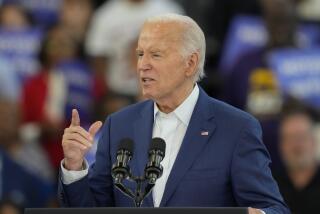Soviet Radicals Threaten Walkout at Party Congress
MOSCOW — Radicals belonging to the Soviet Communist Party’s Democratic Platform warned Sunday that they will walk out of a crucial party congress if it does not adopt fundamental reforms, including the abandonment of communism as a party goal.
A national conference of the Democratic Platform, which wants a real end to the party’s monopoly of political power and pluralism in party ideology, said that if its demands are not met, it will break with the Communist Party and form another, the first such split since the time of V. I. Lenin, the Bolshevik leader.
“The Communist Party will be denounced by the masses in the nearest future, and if the Democratic Platform remains in it, then it will certainly join the party in its collapse,” Vladimir N. Lysenko, one of the faction’s leaders, said in explaining the group’s decision.
A resolution adopted at the weekend conference calls on the party to “renounce communism as the objective of the Soviet Communist Party and proclaim as its goal the building of a democratic society on the principles of freedom, justice and solidarity.”
It blames the country’s multiple political and economic crises on the “inconsistency, indecisiveness and either incompetence or unwillingness of the leading (party) structures to carry out radical reforms.”
The Democratic Platform will also call for the party’s withdrawal from the military, the police and other security forces, including the KGB, an end to the official status that party committees have at Soviet enterprises and organizations and a free press.
It wants the party to become a parliamentary party, seeking power only in elections and exercising it only through legislative and executive bodies. Anticipating its own break, the Democratic Platform calls for the distribution of Communist Party property among the country’s emerging political movements.
But Lysenko, a delegate to the congress, predicted that the party, after a 72-year monopoly of power, will still prove unable to undertake such a fundamental renewal.
“As a result, the Democratic Platform will split from the Communist Party to form a new party,” he said. “Still, it is very important for us to come to the congress because of those millions of Communists who still do not understand the essence of the Soviet Communist Party.”
As a matter of tactics, the 100 members of the Democratic Platform who won election as delegates will remain at the congress, starting July 2, until the end to use it as a forum to argue their positions and then try to take delegations from several of the Soviet Union’s constituent republics--including Estonia, Georgia and Moldavia--with them as they leave.
“The time has come to quit the party, proclaim it immoral and set up another organization, an alternative,” Igor Chubais, another leader, said as the majority of delegates to the conference voted to quit if the Democratic Platform’s proposals are not adopted.
The group believes it might draw as many as 600,000 members--a fraction of the 18 million members of the Communist Party but enough, organizers say, to compete in most urban elections. Under a constitutional amendment sponsored by President Mikhail S. Gorbachev, multi-party politics has been allowed in the Soviet Union since March.
According to its own polls, the “political theses” put forward by the Democratic Platform are more widely supported than the party’s official draft platform, and the faction’s leaders believe that they have the sympathy, if not the active support, of 40% of party members and a majority outside the party.
But whether the Democratic Platform’s best known supporters--Boris N. Yeltsin, the populist president of the Russian Republic, and Mayors Gavriil Popov of Moscow and Anatoly Sobchak of Leningrad--will quit the Communist Party and join the new group remains uncertain.
An analysis of poll results by political scientists at the Moscow Higher Party School, the effective headquarters of the Democratic Platform, said that its support is far from solid, even among sympathizers.
“A significant number of party members, regarding the Democratic Platform with approval, do not share many of its ideas,” the analysis warned, “but only support the fact that an alternative movement has sprung up within the Soviet Communist Party.”
The character and shape of the new party is also unresolved, and organizers said they will probably not hold a founding congress before October.
Although many supporters of the Democratic Platform would like it to become a social democratic party in the West European tradition, Vyachelsav Shostakovsky, the group’s chairman and rector of the Moscow Higher Party School, which trains Communist Party officials, said he thinks that another philosophy and form will have to be developed.
“We do not have the roots or the traditions here in Russia for a social democratic party,” Shostakovsky said. “It is difficult to predict, with so many uncertainties, how things will turn out.”
Formation of the Democratic Platform early this year brought demands from conservatives within the Communist Party leadership for the expulsion of its members, and the party’s ruling Politburo set in motion a purge two months ago to “cleanse” the party ranks before the congress.
After a few well-publicized dismissals and forced resignations, however, little seems to have come of the effort, though the Democratic Platform managed to capture only 2% of the 4,700 seats in the election of delegates to the party congress.
The mainstream Moscow party organization, whose million members make it the largest party group in the country, meanwhile published a pre-congress platform of its own on Sunday, sharply criticizing the national leadership for drifting into “an ideological and organizational crisis.”
More to Read
Sign up for Essential California
The most important California stories and recommendations in your inbox every morning.
You may occasionally receive promotional content from the Los Angeles Times.










